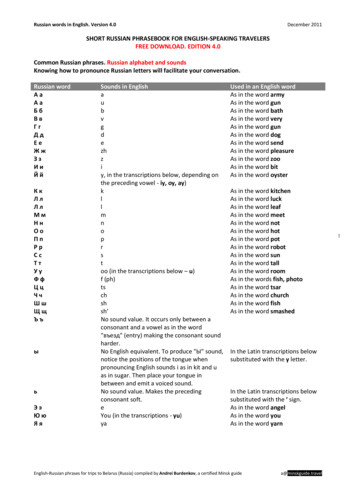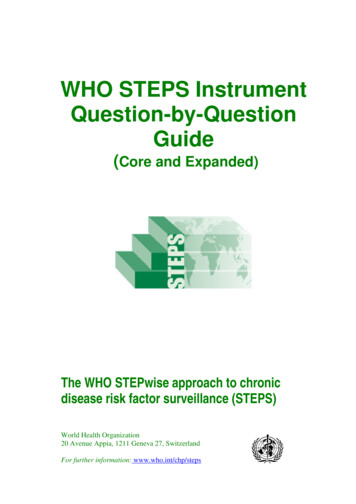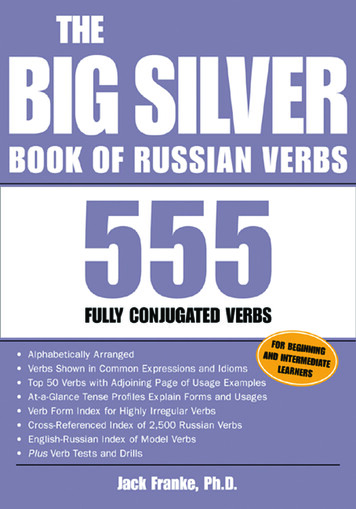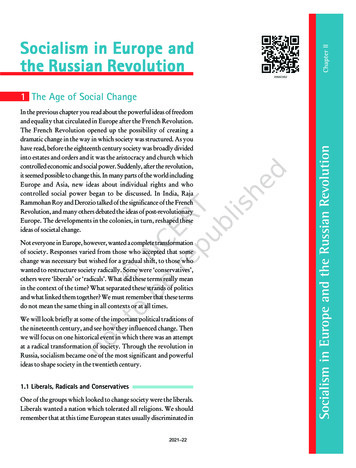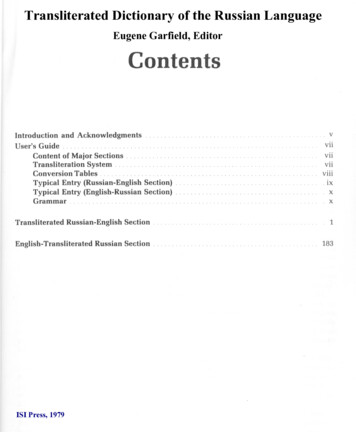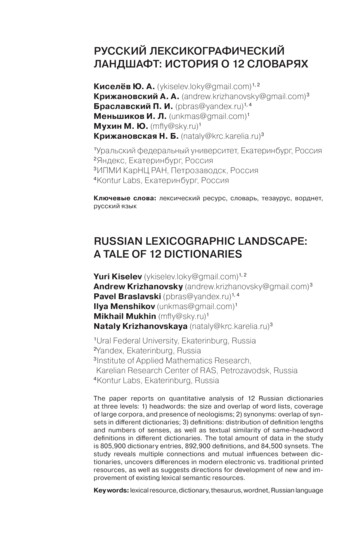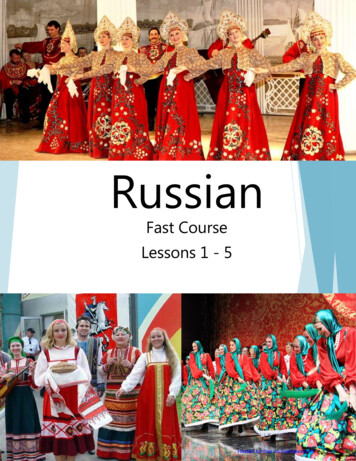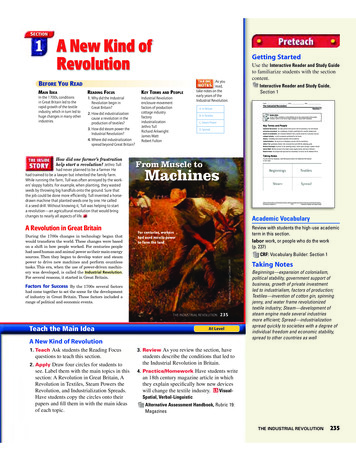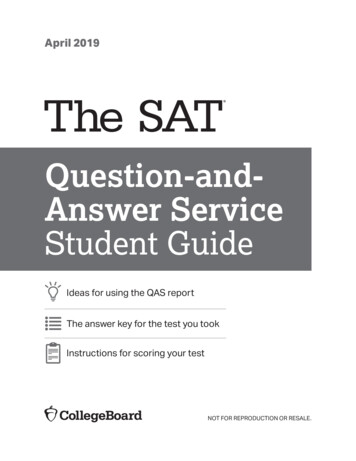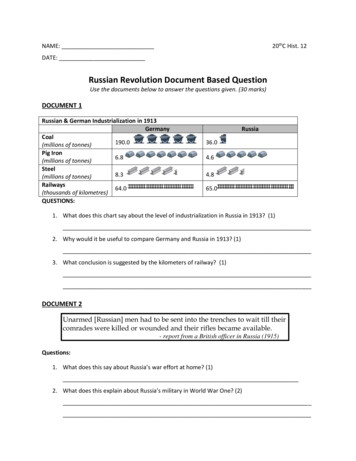
Transcription
20thC Hist. 12NAME:DATE:Russian Revolution Document Based QuestionUse the documents below to answer the questions given. (30 marks)DOCUMENT 1Russian & German Industrialization in 1913GermanyCoal190.0(millions of tonnes)Pig Iron6.8(millions of tonnes)Steel8.3(millions of tonnes)Railways64.0(thousands of kilometres)QUESTIONS:Russia36.04.64.865.01. What does this chart say about the level of industrialization in Russia in 1913? (1)2. Why would it be useful to compare Germany and Russia in 1913? (1)3. What conclusion is suggested by the kilometers of railway? (1)DOCUMENT 2Unarmed [Russian] men had to be sent into the trenches to wait till theircomrades were killed or wounded and their rifles became available.- report from a British officer in Russia (1915)Questions:1. What does this say about Russia’s war effort at home? (1)2. What does this explain about Russia’s military in World War One? (2)
DOCUMENT 3Percentage Increase in Food Prices, December 1916-February 1917FOODPercentage IncreaseFOODPercentage 25%Questions:1. How does this chart explain the February Revolution? (1)2. How does this chart conflict with your understanding of the February revolution? Explain (2)DOCUMENT 4The NEW YORK TIMESMarch 12, 1917“Hunger Causes Petrograd Riots”The question of the food supply of the capital of Russia has reached a crisis. Petrograd isparticularly badly situated on the confines of the empire, in a region incapable of producingbreadstuff, and therefore wholly dependent upon railways for the necessaries of daily life. . . .The people have cheerfully endured every manner of inconvenience throughout the long Winterin obtaining food supplies. Latterly, however, there has been witnessed the phenomenon ofshortage in certain quarters of the city of the staple food of the common people, namely, thefavorite Russia black bread. . . . On Thursday a number of women and younger men of theworking class made a peaceful demonstration of protest against the mismanagement of the foodsupplies. A similar movement was noticed in certain quarters of the city yesterday.”Questions:1. Why were food shortages a major problem in Petrograd? (1)2. How did food shortages contribute to a revolutionary movement in Russia? (2)
DOCUMENT 5Memorandums from the Office of the American Consulate General in Moscow to the United States StateDepartment. Source: National Archives, Washington, DC. http://history.hanover.edu/texts/tel3.htmlMarch 19, 1917. The coup d’etat, a stage of the uncompleted revolution, executed by revolutionaryworkingmen and soldiers, too recently recruited to have acquired discipline or to have lost touch with theirlate companions in field and factory, has whetted already keen appetites for land, social reorganization andautonomy or independence. . . . Discipline was shaken, perhaps irreparably, when soldiers disarmed theirofficers. In the absence of popular interest in the war, the zeal of the revolutionists and to a certain extent ofthe liberals also having depended always on the uses they expected to make of the difficulties created by thewar in the reshaping of home affairs, it is to be feared that troops at the front will slip away from theircommands and return to take part in the carnival of liberty, which to most of them means seizing the largeestates for themselves. The workingmen are demanding an immediate Constituent Assembly and there is atendency not to return to factory and barrack , nor to yield newly acquired weapons, until the political andsocial reorganization are assured.March 20, 1917. Subject. The political and economical situation in Moscow. . . . At the present writing thestreet cars are all running, and life has assumed its normal course. There is an undercurrent of unrest,however, and the shortage of food supplies tends to augment the discontent. Long bread lines stretching forblocks may be seen on every street waiting often to be told that there is none left. The daily allowance is . . .nine tenths of a pound. To obtain this one must stand in the bread lines for two or three hours, and oftenlonger. The supply of flour is short and the revolution of the past few days has diminished even this. . . .Prices of all articles of necessity are rapidly rising. It is difficult to give a table showing same as the figuresgiven out are purely fictitious, each shop charging what they can get. Flour, for instance cannot be bought atall. There is none for sale in the city. Meat is practically unobtainable, and then only three days in the week.Milk, eggs, flour, bread, and meat will soon be sold only by card. The city is thronged with refugees andhouses are unobtainable even at exorbitant prices.Questions:1. What concerns about the revolutionary movement are expressed in the first memo? (1)2. According to the second memo, what are conditions like in Moscow? (1)3. Why do you think the American government is interested in Russian politics? (2)
DOCUMENT 6Political Slogans of the Bolshevik Party (1917).“Peace, Bread and Land!”“All power to the Soviets!”Question:1. Why would these slogans appeal to the Russian people? (4)DOCUMENT 7Street demonstration in Petrograd (June 18, 1917). The protest is against the new Provisional government. Thebanner in the foreground reads “Down With The 10 Capitalist Ministers/ All Power To The Soviets Of Workers’,Soldiers’, And Peasants’/ We Demand That Nicholas II Be Transferred To The Peter-Paul Fortress.”
Questions:1. What does this protest tell us about political conditions in Russia? (3)DOCUMENT 8Lessons of the Revolution by V.I. Lenin, July 1917“The people want peace. Yet the revolutionary government of free Russia has resumed the war ofconquest on the basis of those very same secret treaties which ex-Tsar Nicholas II concludedwith the British and French capitalists so that the Russian capitalists might plunder othernations. . . . There is no bread. Famine is again drawing near. Everybody sees that the capitalistsand the rich are unscrupulously cheating the treasury on war deliveries, that they are raking infabulous profits through high prices, while nothing whatsoever has been done to establisheffective control by the workers over the production and distribution of goods. The capitalistsare becoming more brazen every day; they are throwing workers out into the street, and this at atime when the people are suffering from shortages. A vast majority of the peasants . . . haveloudly and clearly declared that landed proprietorship is an injustice and robbery. Meanwhile, agovernment which calls itself revolutionary and democratic has been . . . deceiving them bypromises and delays. . . . The government has become so brazen in its defense of the landownersthat it is beginning to bring peasants to trial for “unauthorized” seizures of land. The lesson ofthe Russian revolution is that there can be no escape for the working people from the iron gripof war, famine, and enslavement by the landowners and capitalists unless . . . they renounce allcompromises with the bourgeoisie. . . . . Only the revolutionary workers, if supported by thepeasant poor, are capable of smashing the resistance of the capitalists and leading the people ingaining land with out compensation, complete liberty, victory over famine and the war, and ajust and lasting peace.”Questions:1. Why does Lenin denounce the new Provisional government? (2)2. According to Lenin, what lesson must be learned from the revolution? (2)
DOCUMENT 9Supported by an overwhelming majority of the workers,soldiers and peasants, and basing itself on the victoriousinsurrection of the workers and the garrison of Petrograd,the Congress hereby resolves to take government powerin its own hands. The Provisional Government is deposedand most of its members are under arrest. The Sovietauthority will at once propose a democratic peace to allnations and an immediate armistice on all fronts. TheCongress resolves that all local authority shall betransferred to the Soviets of the Workers', Soldiers', andPeasants' Deputies, which are charged with the task ofenforcing revolutionary order- Proclamation by the Congress of Soviets, 27 October 1917.Questions:1. With the overthrow of the Provisional Government, which organization will be in power? (1)2. What is the first plan of this new government? (2)
20thC Hist. 12NAME:DATE:Russian Revolution Document Based QuestionUse the documents below to answer the questions given. (30 marks)DOCUMENT 1Russian & German Industrialization in 1913GermanyCoal190.0(millions of tonnes)Pig Iron6.8(millions of tonnes)Steel8.3(millions of tonnes)Railways64.0(thousands of kilometres)QUESTIONS:Russia36.04.64.865.04. What does this chart say about the level of industrialization in Russia in 1913? (1)RUSSIA WAS FAR BEHIND GERMANY IN 19135. Why would it be useful to compare Germany and Russia in 1913? (1)BECAUSE IN 1914 THEY WOULD FIGHT AGAINST EACH OTHER6. What conclusion is suggested by the kilometers of railway? (1)EVEN THOUGH RUSSIA HAS MORE RAILWAY, IT IS A LARGER COUNTRY, SO THECONCLUSION IS THAT RUSSIA IS ACTUALLY BEHIND GERMANY IN THIS AS WELLDOCUMENT 2Unarmed [Russian] men had to be sent into the trenches to wait till theircomrades were killed or wounded and their rifles became available.- report from a British officer in Russia (1915)Questions:3. What does this say about Russia’s war effort at home? (1)RUSSIA WAS NOT ABLE TO PRODUCE ENOUGH WEAPONS4. What does this explain about Russia’s military in World War One? (2)THIS EXPLAINS THE WEAKNESS OF RUSSIA'S MILITARY. IT ALSO EXPLAINS THEIR HIGHRATES OF MUTINY AND THE DISSATISFACTION OF THE SOLDIERS WITH THE TSAR.
DOCUMENT 3Percentage Increase in Food Prices, December 1916-February 1917FOODPercentage IncreaseFOODPercentage 25%Questions:3. How does this chart explain the February Revolution? (1)HIGH PRICES RISE INDICATE A SHORTAGE IN SUPPLY, WHICH WAS A CAUSE OF THE REV'N4. How does this chart conflict with your understanding of the February revolution? Explain (2)THE FEB REV'N STARTED BECAUSE OF BREAD, BUT BREAD ACTUALLY HAD THE LOWEST PRICEINCREASE. THIS IS IRONIC, BUT UNDERSTANDABLE BECAUSE BREAD IS A STAPLE SUPPLYDOCUMENT 4The NEW YORK TIMESMarch 12, 1917“Hunger Causes Petrograd Riots”The question of the food supply of the capital of Russia has reached a crisis. Petrograd isparticularly badly situated on the confines of the empire, in a region incapable of producingbreadstuff, and therefore wholly dependent upon railways for the necessaries of daily life. . . .The people have cheerfully endured every manner of inconvenience throughout the long winterin obtaining food supplies. Latterly, however, there has been witnessed the phenomenon ofshortage in certain quarters of the city of the staple food of the common people, namely, thefavorite Russia black bread. . . . On Thursday a number of women and younger men of theworking class made a peaceful demonstration of protest against the mismanagement of the foodsupplies. A similar movement was noticed in certain quarters of the city yesterday.”Questions:1. Why were food shortages a major problem in Petrograd? (1) PETROGRAD IS DEPENDANTON FOOD SUPPLIES (by rail) BECAUSE OF ITS LOCATION. THEY CAN’T PRODUCE BREAD2. How did food shortages contribute to a revolutionary movement in Russia? (2)WHEN THERE IS A SHORTAGE OF STAPLES, (bread), THEN PEOPLE BEGIN TO PROTEST.THESE PROTESTS ARE THE SEEDS OF REVOLUTION)
DOCUMENT 5Memorandums from the Office of the American Consulate General in Moscow to the United States StateDepartment. Source: National Archives, Washington, DC. http://history.hanover.edu/texts/tel3.htmlMarch 19, 1917. The coup d’etat, a stage of the uncompleted revolution, executed by revolutionaryworkingmen and soldiers, too recently recruited to have acquired discipline or to have lost touch with theirlate companions in field and factory, has whetted already keen appetites for land, social reorganization andautonomy or independence. . . . Discipline was shaken, perhaps irreparably, when soldiers disarmed theirofficers. In the absence of popular interest in the war, the zeal of the revolutionists and to a certain extent ofthe liberals also having depended always on the uses they expected to make of the difficulties created by thewar in the reshaping of home affairs, it is to be feared that troops at the front will slip away from theircommands and return to take part in the carnival of liberty, which to most of them means seizing the largeestates for themselves. The workingmen are demanding an immediate Constituent Assembly and there is atendency not to return to factory and barrack , nor to yield newly acquired weapons, until the political andsocial reorganization are assured.March 20, 1917. Subject. The political and economical situation in Moscow. . . . At the present writing thestreet cars are all running, and life has assumed its normal course. There is an undercurrent of unrest,however, and the shortage of food supplies tends to augment the discontent. Long bread lines stretching forblocks may be seen on every street waiting often to be told that there is none left. The daily allowance is . . .nine tenths of a pound. To obtain this one must stand in the bread lines for two or three hours, and oftenlonger. The supply of flour is short and the revolution of the past few days has diminished even this. . . .Prices of all articles of necessity are rapidly rising. It is difficult to give a table showing same as the figuresgiven out are purely fictitious, each shop charging what they can get. Flour, for instance cannot be bought atall. There is none for sale in the city. Meat is practically unobtainable, and then only three days in the week.Milk, eggs, flour, bread, and meat will soon be sold only by card. The city is thronged with refugees andhouses are unobtainable even at exorbitant prices.Questions:4. What concerns about the revolutionary movement are expressed in the first memo? (1)THE MAJOR CONCERN IS THAT THE WAR EFFORT WILL BE WEAKENED- “Troops at the frontwill slip awayfrom their commands”5. According to the second memo, what are conditions like in Moscow? (1)LIFE APPEARSTO BE NORMAL, BUT EXTREME SHORTAGES OF FOOD THAT ARE GETTING WORSE6. Why do you think the American government is interested in Russian politics? (2)THE AMERICAN GOVERNMENT IS CONCERNED ABOUT THE EMERGENCE OF COMMUNISM.THEY ARE ALSO ARE WORRIED THAT RUSSIA MIGHT PULL OUT OF THE WAR
DOCUMENT 6Political Slogans of the Bolshevik Party (1917).“Peace, Bread and Land!”“All power to the Soviets!”Question:2. Why would these slogans appeal to the Russian people? (4) THESE SLOGANS APPEAL TOTHE PEOPLE BECAUSE THEY REFER TO THEIR MAJOR PROBLEMS. PEACE IS A REFERENCE TO ADESIRE TO END THE UNPOPULAR WAR, BREAD IS A REFERENCE TO THE FOOD SHORTAGES,AND LAND REFERS TO THE NEED FOR LAND REFORM TO TAKE THE LAND AWAY FROM THEWEALTHY LAND OWNERS. ALL POWER TO THE SOVIETS IS A REFERENCE TO THE PEOPLE'SDISSATISFACTION WITH THE PROVISIONAL GOV'TDOCUMENT 7Street demonstration in Petrograd (June 18, 1917). The protest is against the new Provisional government. Thebanner in the foreground reads “Down With The 10 Capitalist Ministers/ All Power To The Soviets Of Workers’,Soldiers’, And Peasants’/ We Demand That Nicholas II Be Transferred To The Peter-Paul Fortress.”
Questions:2. What does this protest tell us about political conditions in Russia? (3)THIS PROTEST SHOWS THE DISSATISFACTION WITH THE PROVISIONALGOVERNMENT. CALLING THE MINISTERS CAPITALISTS SUGGESTS THAT THEY DON'T FEELTHERE HAS BEEN CHANGE AND THAT THEY VALUE SOCIALIST IDEALS. THEY ARE EXPRESSING ADESIRE TO GET RID OF THE PROVISIONAL GOVERNMENT. THIS SUPPORTS REVOLUTIONDOCUMENT 8Lessons of the Revolution by V.I. Lenin, July 1917“The people want peace. Yet the revolutionary government of free Russia has resumed the war ofconquest on the basis of those very same secret treaties which ex-Tsar Nicholas II concludedwith the British and French capitalists so that the Russian capitalists might plunder othernations. . . . There is no bread. Famine is again drawing near. Everybody sees that the capitalistsand the rich are unscrupulously cheating the treasury on war deliveries, that they are raking infabulous profits through high prices, while nothing whatsoever has been done to establisheffective control by the workers over the production and distribution of goods. The capitalistsare becoming more brazen every day; they are throwing workers out into the street, and this at atime when the people are suffering from shortages. A vast majority of the peasants . . . haveloudly and clearly declared that landed proprietorship is an injustice and robbery. Meanwhile, agovernment which calls itself revolutionary and democratic has been . . . deceiving them bypromises and delays. . . . The government has become so brazen in its defense of the landownersthat it is beginning to bring peasants to trial for “unauthorized” seizures of land. The lesson ofthe Russian revolution is that there can be no escape for the working people from the iron gripof war, famine, and enslavement by the landowners and capitalists unless . . . they renounce allcompromises with the bourgeoisie. . . . . Only the revolutionary workers, if supported by thepeasant poor, are capable of smashing the resistance of the capitalists and leading the people ingaining land without compensation, complete liberty, victory over famine and the war, and ajust and lasting peace.”Questions:3. Why does Lenin denounce the new Provisional government? (2) HE CLAIMS THEGOVERNMENT SUPPORTS THE CAPITALISTS WHO PROFIT FROM HIGH PRCES AND CREATE THEPROBLEMS IN THE CITIES, WHILE THEY SUPPORT THE LANDOWNERS AGAINST PEASANTS WHOSIEZE LAND. THE PROVISIONAL GOV'T HAS LOST ITS REVOLUTIONARY PURPOSE.4. According to Lenin, what lesson must be learned from the revolution? (2) ONLY A REV'N BYTHE WORKERS WITH NO COMPROMISES WITH THE BOURGEOISIE WILL BE SUCCESSFUL
DOCUMENT 9Supported by an overwhelming majority of the workers,soldiers and peasants, and basing itself on the victoriousinsurrection of the workers and the garrison of Petrograd,the Congress hereby resolves to take government powerin its own hands. The Provisional Government is deposedand most of its members are under arrest. The Sovietauthority will at once propose a democratic peace to allnations and an immediate armistice on all fronts. TheCongress resolves that all local authority shall betransferred to the Soviets of the Workers', Soldiers', andPeasants' Deputies, which are charged with the task ofenforcing revolutionary order- Proclamation by the Congress of Soviets, 27 October 1917.Questions:3. With the overthrow of the Provisional Government, which organization will be in power? (1)THE CONGRESS OF SOVIETS TOOK POWER AND GAVE LOCAL AUTHORITY TO LOCAL SOVIETS4. What is the first plan of this new government? (2) TO END THE WAR, "PROPOSE ADEMOCRATIC PEACE, AN IMMEDIATE ARMISTICE ON ALL FRONTS"
MARKING NOTES1. FULL SENTENCESorIf you use full sentences, you will better communicate your ideas, anddemonstrate a more sophisticated understanding of the issues. Complete and full sentencesreflect full and complete thoughts.2. USE THE DOCUMENTS!!! This may not always be possible, but it usually is. There is a differencein quality of answers:a. With the overthrow of the Provisional Government, which organization will be inpower?i. The Sovietcorrect, but insufficient. Incomplete sentence, no context, noreference to the document. No marks will be earned.ii. The Soviets will take power.Correct, and a full sentence. No reference to thedocument. Only part marks may be earned.iii. The congress will take power and then transfer local authority to the Soviets.A full sentence that uses the phrasing in the document, reflecting a correctreading, and application of that reading to answer the question. Full marks.iv. “The Congress hereby resolves to take government power”, and “all localauthority shall be transferred to the Soviets of the Workers’, Soldiers’, andPeasants’ Deputies.”full marks!Correct, and makes use of quotes. Best answer, always
Russian Revolution Document Based Question Use the documents below to answer the questions given. (30 marks) DOCUMENT 1 Russian & German Industrialization in 1913 . street cars are all running, and life has assumed its normal course. There is an undercurrent of unrest, however, and the
